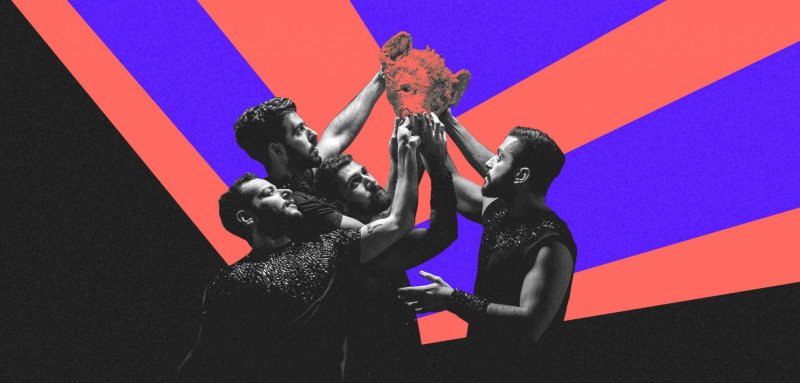“We were surprised to witness a campaign of fabrication that hits freedom of expression”, claimed Mashrou’ Leila in their bold and honest statement published on Monday the 22nd of July. The famous and controversial Lebanese band has been responding to a plethora of attacks concerned with supposed blasphemy in their songs on one hand, and the sexual orientation of their lead singer on another.
After the Maronite Catholic Eparchy of Jbeil demanded that the band’s show, scheduled to take place at the Byblos International Festival on the 9th of August, be cancelled, a nation-wide debate between religious institutions and activists emerged.
While significant focus has been directed towards a general discussion revolving around “freedom of expression” is restricted to this particular event, we ought to examine it as a debate resulting from two years of extensive abuse against the LGBTQ+ community along with the rise of fascism in Lebanon.
It’s worth noting that the abuses against Mashrou’ Leila aren’t reduced to online threats and harassments spearheaded by right-wing social media pages such as “961finiqia” and “Jesus is our Lord”; many members of the band have also been interrogated by State Security, later released on the 24th of July.
Widespread and Diverse Solidarity
In response to abuses and measures stemming from both societal structures and authority, statements of solidarity were released by journalists, human rights organizations and youth groups. Building on this momentum, a demonstration will take place Monday 29 July in opposition to any form of suppression or state-sponsored violence affecting activists, artists or any citizen.In a context where your sect or religion mark the backbone of your political environment, it is not a surprise that conflicting religious discourses play a crucial role in moving this conversation forward. Although this public debate has been portrayed as one between religious and secular individuals/organizations, many religious figures opposed the Eparchy’s statement.
“When will we end this fear of thinking and discussing?” said Priest Nassim Kastoun in response to the recent calls to ban the group from playing in Jbeil. Kastoun stressed the importance of peaceful communication, rather than censorship to instill fear. Similarly, Priest Martin Eid released a statement emphasizing that “profanity, the sword and the language of violence are not part of the teachings of our teacher”.
On 28 May, Lebanon’s Telecommunication Ministry prohibited the use of Grindr, a dating app largely used by the LGBTQ+ community. In a memo attempting to justify such a measure, the ministry specifically claimed that Grindr “secures romantic and sexual communication for homosexuals and bisexuals”.
Mashrou’ Leila isn't the only victim. Lebanese activist Karim Safieddine writing about the two years of extensive abuse against the LGBTQ+ community and the rise of fascism in Lebanon.
Soaring Anti-LGBTQ Violence
“Each religious group is trying to showcase their power and trying to find the perfect scapegoat”, says George Azzi, the Executive Director of the Arab Foundation For Freedoms and Equality.Azzi suggests that inciting against such vulnerable communities is a way for both Muslim and Christian religious institutions to display their power, control and authority. He sees “Mashrou’ Leila as a perfect opportunity for a populist campaign”, in reference to the many statements released by the Eparchy and its circle.
Azzi’s analysis falls perfectly in line with a comprehensive analysis behind the rising anti-LGBTQ violence and incitement in the past two years. Less than a year ago, the former Mufti Mohammad Kabbani released a statement demanding the cancellation of a queer speed dating event organized by the Gender and Sexuality Club at the American University of Beirut.
With skepticism concerning the role of religious institutions in Lebanon on the rise, many clerics such as former Mufti Kabbani have targeted the queer community to impose their discourse and authority. In fact, on the 29th of September last year, not long before Sheikh Kabbani’s statement, attempts to shut down a workshop that involves diverse sexual orientations and gender identities have followed public incitement by the Muslim Scholars Association.
Not restricted to public events and conferences, such state measures also include interferences in the private lives of the LGBTQ+ community. On 28 May, Lebanon’s Telecommunication Ministry prohibited the use of Grindr, a dating app largely used by the LGBTQ+ community. In a memo attempting to justify such a measure, the ministry specifically claimed that Grindr “secures romantic and sexual communication for homosexuals and bisexuals”.
Accompanied by intensified racism, a report released by Amnesty International for the year of 2018 emphasized that “police harassed and abused lesbian, gay, bisexual, transgender and intersex people, especially in refugee and migrant communities.”
Signs of Rising Fascism
Noting the different instances of suppression faced by the LGBTQ+ community in the past two years, one ought to observe what happened with Mashrou’ Leila as part of a wider context. This includes but is not restricted to religious authorities gripping onto what’s left of their legitimacy, and ring-wing political forces scapegoating vulnerable groups and evading responsibility for the deteriorating economic and security situation.With many citizens mobilizing their anger and efforts against those that lack a vote and voice, the country’s sectarian political forces have partially succeeded in making their constituencies turn a blind eye to their mismanagement of the state and its resources. Nevertheless, I say “partially” because solidarity by different youth groups such as those participating in Monday’s protest find their way through in spreading an alternative discourse, aiming to contradict the status quo in favor of a more inclusive and open Lebanon.
Raseef22 is a not for profit entity. Our focus is on quality journalism. Every contribution to the NasRaseef membership goes directly towards journalism production. We stand independent, not accepting corporate sponsorships, sponsored content or political funding.
Support our mission to keep Raseef22 available to all readers by clicking here!
Interested in writing with us? Check our pitch process here!





